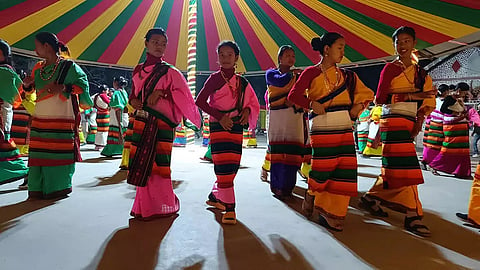
- Home
- Live Blog
- Breaking News
- Top Headlines
- Cities
- NE News
- Sentinel Media
- Sports
- Education
- Jobs

OUR CORRESPONDENT
HAFLONG: Busu Dima, the prime festival of the people belonging to the Dimasa community was celebrated throughout the district of Dima Hasao district with great enthusiasm from Friday. At Haflong, Busu was celebrated in several places like Disgao Raji, Dibarai, Digrik, Town Rajee, Boildura and Gdain Rajee, Sambudhan Rajee, Raja Gobinda Chandra Raji, Diham Raji etc. with traditional fervour.
Busu is one of the most important and biggest festivals celebrated by the Dimasa people. 'Busu' means the festival of eating newly grown autumnal rice, and so it could be considered as the harvesting festival too, which mirrors the rich culture and tradition of the Dimasa community.
Dimasa people observed 'Busu' by arranging feasts and various cultural functions. 'Busu' is celebrated in three different ways, namely Jidab, Surem, and Hangsaomanouba. 'Jidab' is the simplest form of 'Busu'. Surem is a celebration which lasts for three nights. 'Surem' Busu is celebrated frequently where as 'Hangsaoinanaoba' is celebrated occasionally as it requires large amount of money and manpower. Generally the expenses of the 'Busu' are borne by the villagers. There is a custom in Dimasa community where the people collectively help others in cultivation without taking wages for the work. But they collect rice or paddy after harvesting to celebrate 'Busu'.
When the community decides to celebrate 'Hangsaomanaoba', a separate plot of land is cultivated and from which the expenses for the celebration is taken. The 'Surem Busu' lasts for three days while the 'Hangsaomanaoba' lasts for seven days.
On 'Bususataiba', the first day of the Busu, meat is distributed to every household. In 'Busuma', the second day, the boys with older men sing 'Bagaoba', welcoming the guests. The 'Kunang', village headman, sings a devotional song, seeking blessings on behalf of the villagers from Lord Shiva, so that the villagers could spend the festive days with joy and merry-making. Traditional games and sports are also organized during the 'Busu'.
The boys and girls perform dances and sing songs during these days. They beat drums named 'Khram', play pipes called 'murri', flutes'supin' and 'Khram dubung'. Playing of 'murri' should be continued from the beginning of 'Busu' till the last day of the festival. 'Judima' (Rice beer) pork, chicken, fish are enjoyed during the 'Busu'. Thus the 'Busu' symbolizes the unity and coexistence among the people of Dima Hasao.
Also Watch: